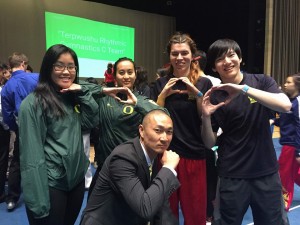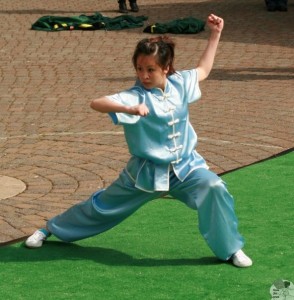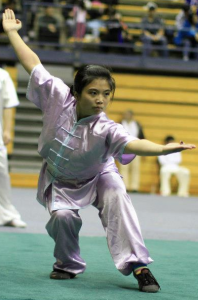Sugiyama is a former UO Wushu member who started the annual collegiate wushu tournament 20 years ago. Sugiyama was also the University of Oregon Wushu’s second captain, following after Daniel Wu.
How did you get into wushu?
Wushu was not something that I was looking for. It kind of just happened to me. My freshman year of college I’d gotten very involved with APASU and that’s how I met Dan Wu. He was just starting the wushu club and had put some flyers around the APASU office and invited the members to come check it out.
I’d never heard of wushu and honestly, I wasn’t initially interested at all. However, a few friends went and encouraged me to go so a few weeks after Dan started teaching I tried my first workout.
I kind of instantly fell into it. I remember the first workouts being incredibly difficult. Everything was hard. I felt very uncoordinated and terribly inflexible, but something clicked. I liked that it was this foreign thing for my body and brain to try and grasp. I made it a priority to make every practice.
Can you describe what the UO wushu club was like in the first few years?
The club was small and we worked out in the basement of the Gerlinger Annex. This is going to sound strange but there was close to zero social interaction at practices. Dan ran things very formally and there was no talking. The only break we got was one water break halfway through practice. We all collectively walked down the hall to the drinking fountain, took turns drinking a few sips, and then all walked back to practice. Awkwardly, we didn’t talk during this break!
People came and went and eventually we developed a small core group. Just a handful really. With time we started talking to each other and became friends. I think one of the first events that really brought us together was going to watch The Legend of Fong Sai Yuk at the Bijou Theater’s Kung Fu movie festival.
What advice would you give to athletes and students training wushu that you wish you’ve known earlier?
Don’t let competition consume you. Or more importantly, don’t let winning and losing define how you value your wushu training. How you fare in competition is determined by several elements: your performance, your competitors’ performance, the judging, and politics. You only have control over your performance.
I loved competition and after making the US Team in 1999 and competing at Worlds, I made it a very important goal to make the team again and go back to Worlds and improve on my performance there.
I returned to team trials in 2001, 2003 and 2005 and never made the A team again. I never went to Worlds again. This was really crushing to me as I felt like I’d put everything I had into wushu. I quit my job in 2002 so I could enroll in the Beijing Sports University to train every day. I made a lot of sacrifices in my life so I could make it to practice and travel for competition and I qualified those sacrifices with my goal of making the US Team.
In 2005, I gave myself an ultimatum that I would go to team trials one last time. I told myself, if I don’t make it, then it’s time for me to quit wushu. The 2005 team trials was one of the worst trials I’ve ever been to in terms of perceived fairness and organization. For people that were there, and some of us just had this conversation over dinner after collegiates, it was a turbulent event. There was tension between coaches, judges, organizers and athletes the entire weekend and a lot of people left with a very sour taste in their mouths.
For myself, I walked away bitter. I felt cheated. I thought that this sport, that I’d dedicated so much of my energy and passion to, had become a sham and I’d wasted my time.
So I quit. Even though I’d always been pretty vocal about poor organization and politics in the wushu scene, I didn’t really share these feelings with anyone. I had so many great memories and experiences through wushu, but there was this deep hurt because of what I perceived as failures within the wushu community and a failure to reach my goal.
One of the reasons that I’m back involved with the sport, especially as a judge, is because I feel very strongly that athletes deserve to be judged fairly. Athletes deserve to compete at well-organized events. Athletes deserve more transparency in how they are being scored.
But back to the advice that I’d give to athletes: don’t let your competition results define you. Share your love for the art and support your fellow competitors.
What inspired you to organize the first collegiate wushu tournament?
I spent part of the summer before my senior year in Berkeley, CA and trained with Calwushu and Pacific Wushu. Within a small group of friends we started talking about the idea of having a wushu tournament for college students where they could represent their schools and compete as a team. It was a pretty simple idea, but we got very excited about it because it had never been done. We talked about it over a few late nights after wushu practice and eventually collectively decided to make it happen.
What were some challenges you faced in organizing such a huge tournament?
First, it wasn’t a huge tournament! It was tiny. There might have been less than 30-40 competitors.
The biggest challenge was that it’d never been done before. Somehow we had to convince people, competitors and judges, to show up. We pulled a lot of favors and reached out to everyone we knew.
Can you describe the first collegiates?
It was a really special day. I think everyone felt like we were part of something new and were proud to be there representing their schools. We’d come together as friends and fellow martial artists because of our shared love for wushu.
Here’s some trivia from the first collegiates for you:
– Several of the competitors went on to start Rotten Tomatoes
– One of the judges brought two of his young students to watch. Those two boys were Phillip and Peter Dang, who went on to dominate the US wushu scene (including collegiates) and both made the US Wushu Team.
– The head judge was Liu Yu. Her daughter, who was only a few years old at the time, went on to lead the Harvard Wushu club and competed at collegiates.
– One competitor from Oregon sat across from a competitor from Berkeley at the after tournament banquet. They took a liking to each other and are now married with two kids.
– The MC for the day was Dan Wu, the coach of the Oregon Wushu Club. He went on to become a very famous Hong Kong actor and most recently produced and starred in AMC’s “Into The Badlands”
How has collegiate changed over the years?
It’s amazing to see how much the event and the collegiate wushu community has grown! I was very involved for the first few years and gradually took a step back as the next generation of students took the reins. What is truly inspirational to me is that collegiates is a community effort. It’s something that everyone wants to be a part of and you can feel that energy in the room. Collegiates is overseen by a loose organization, there is no president, no board of directors, so sifus nor wushu schools that control it and every year, for the past 20 years, collegiates happens. It’s never missed a year! It started on the west coast, but then traveled to Georgia, Virginia, Maryland and most recently to New York. What an amazing journey! What’s next for collegiate? Will it go to the midwest? The southwest? Could it every go international?
As much as things have grown, the spirit of the event has remained very much the same. I felt it when we all lined up at the very first collegiates and my friend and coach Dan Wu gave an opening speech about how we had planted a seed that grew into a tree and we were enjoying the fruit from the tree. At the risk of sounding extremely sentimental, I feel this way at every single collegiates I’ve been to (by my count, a total of 17).
How have you balanced wushu with your life and job after college?
Ironically, it took me stepping away from wushu and then eventually coming back before I felt that I’d found a balance. Part of that was me going back to school and establishing a new career path in my life. The other part was redefining what wushu meant to me and what role I want to play in the wushu community. I think it’s really important for wushu athletes to have a clear sense of why we practice wushu and what it means to us. It’s going to be different for everyone, but that clarity will guide you. For myself, I continue to practice wushu because I learn so much about myself and ways to understand the world around me. It’s not so much about finding a balance between wushu and my career as much as understanding that they are both very important parts of my life.


